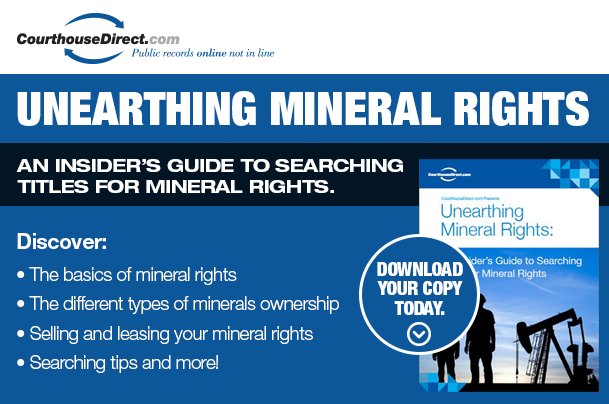 If you own land in a region that's known to contain significant oil and gas resources, your parcel's subsurface mineral rights could be quite valuable. Since recent advances in drilling and exploration technologies have increased the value of previously uneconomical shale and heavy oil deposits, you shouldn't rely on antiquated surveys or mineral maps to make judgments about the value of your property's deposits. You also shouldn't rush to make a decision about whether to lease or sell your mineral rights without consulting an experienced real estate professional. If you're a prospector, you'll need to use a similar set of considerations to determine whether it makes more sense to lease or purchase mineral rights.
If you own land in a region that's known to contain significant oil and gas resources, your parcel's subsurface mineral rights could be quite valuable. Since recent advances in drilling and exploration technologies have increased the value of previously uneconomical shale and heavy oil deposits, you shouldn't rely on antiquated surveys or mineral maps to make judgments about the value of your property's deposits. You also shouldn't rush to make a decision about whether to lease or sell your mineral rights without consulting an experienced real estate professional. If you're a prospector, you'll need to use a similar set of considerations to determine whether it makes more sense to lease or purchase mineral rights.
Obtaining Mineral Rights Through Inheritance or Transfer
Most landowners obtain the mineral rights to their properties through inheritance, transfer or purchase. Landowners who obtain smaller properties in suburban or semi-rural areas that lack energy-extraction infrastructure are liable to overlook or minimize the potential value of their mineral rights. Thanks to ongoing technological advances, properties that lack active or previous leases might become economical at some point in the future. Inheritors of mineral rights should consult with reputable authorities to determine the present value of their property's resources.
How do Mineral Rights Produce Income?
Mineral rights can produce direct streams of income in two ways. Property owners who sell their mineral rights outright may receive one-time or structured payments that account for the current market value of their properties' mineral resources as well as the built-in "appreciation premium." Those who lease their mineral rights receive monthly royalty payments that represent a portion of the actual income from the sale and marketing of extracted oil and gas. The actual amount that lessors stand to receive may vary in accordance with local laws and customs as well as the outcome of situation-specific lease negotiations.
Advantages to Leasing Mineral Rights
Landowners who wish to lease their mineral rights can count on receiving predictable streams of income for a period of several years. Although mineral rights leases aren't generally open-ended, they can come with rather long active terms. Once they expire, they may be renegotiated. As the volume of a given deposit drops, the royalty income that it generates may fall as well. Once exploitation ceases to be profitable, royalty payments dry up. This doesn't render the underlying mineral rights worthless: In the future, improved extraction techniques or new mineral discoveries may make it economical to issue new leases.
Advantages to Selling Outright
Although the market value of a given property's mineral resources varies in accordance with their abundance, accessibility and quality, mineral rights sales generally produce significant streams of income in relatively short order. Depending on their attractiveness, mineral rights customarily fetch about four years' worth of royalty payments at current market rates. This sets up something of a gamble: Depending on market fluctuations and the actual expenses associated with extracting and marketing these resources, there's no guarantee that landowners will get a fair deal for their mineral rights.
Maximizing Value
Accordingly, it's crucial for landowners to maximize the value of their mineral rights. While the attorneys and landmen who work for exploration companies often have little negotiating power, they may be authorized to sweeten lease deals with incentives or bonus payments that accrue over time. Since mineral rights sales are more straightforward, it's customary for landowners to negotiate on price. In either case, careful research is crucial: Landowners who can't back up their assertions with hard data may find themselves on the receiving end of a very raw deal.
Final Thoughts and Miscellaneous Tips
Determining whether to lease or purchase mineral rights isn't easy. Since mineral rights sales are generally irrevocable, it's inadvisable to take this decision lightly. Consult with a licensed real estate attorney who can demonstrate familiarity with mineral rights issues before making a move. Also, don't forget to codify any agreements with written contracts that leave nothing to chance. Your economic future could ride on it.





















